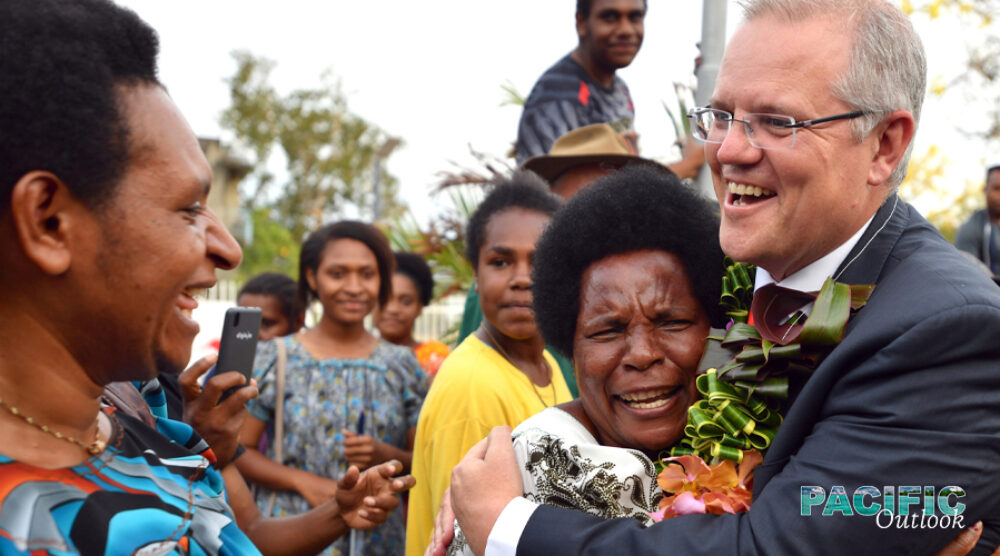TESS NEWTON CAIN AND WESLEY MORGAN |
A new policy brief from the Griffith Asia Institute suggests that if Australia is to strengthen relations with Pacific island countries, policymakers will need to engage more closely with the concerns of Pacific leaders. Above all, Pacific countries want Australia to help tackle their greatest security threat: climate change.
Key points from the policy brief are summarised below:
Australian engagement with the Pacific needs to be driven by more than narrowly-defined security priorities. Australia’s ‘step-up’ in the Pacific is widely understood to be driven by Canberra’s own threat perceptions, particularly a concern that China may leverage infrastructure lending to establish a military base in the region. The Pacific ‘step-up’ is intended to cement relations and limit Chinese influence in the region. Strengthening relations for the long-term will require engaging with island states as partners, on their own terms, and developing initiatives together. Ultimately, developing durable relations with neighbouring states is, in itself, in Australia’s national interests.
Australia’s ‘step-up’ should support Pacific-led regionalism. In the post-colonial period a distinctive form of regional diplomacy has emerged: a ‘Pacific Way’ guided by island sensibilities and protocols. However, Pacific regionalism is in large part absent from Australia’s recent Pacific ‘step-up’, adding to perceptions it is focussed on initiatives that are “done for or to the Pacific, not with it”. Regional initiatives ought to be designed and led by Pacific island states.
Australia’s ‘step-up’ should celebrate Pacific leadership on the global stage. Far from being small and insignificant, Pacific countries are sovereign across a vast swathe of the world’s surface, and possess significant assets, including control of the world’s largest tuna fishery and a valuable voting bloc at the UN. Island states exercise globalleadership in areas such as tackling climate change and protecting the world’s oceans. Australia should support Pacific engagement in multilateral diplomacy and work with Pacific states to strengthen global rules and institutions.
Australia should improve access for Pacific goods. For decades Australia has pursued a regional trade agreement with Pacific island countries. However, a standard free trade agreement will do little to drive economic growth. Australia should direct infrastructure investment toward supporting high-value agricultural exports and look to improve access to Australian markets for Pacific producers.
Australia should improve access for Pacific people. Allowing a greater number of Pacific islanders to migrate and work in Australia would do much to cement relations. Labour mobility schemes should be expanded to allow more Pacific islanders to work in Australia. New options for permanent migration should also be considered, including access visas allowing permanent migration for people from atoll states.
Australia should support Pacific arts, education and sports. Investing in people-to-people links, particularly in the realms of arts, education and sport, can form the basis of long-lasting relationships built on reciprocity and trust. Australia should support the arts and creative industries as means of economic empowerment, and expand the number of scholarships offered to Pacific island students. Programs that link Australian sporting clubs and organisations with island counterparts would help build Pacific-wide sporting communities.
Finally, the single most important thing Australia can do to improve relations with Pacific island countries is to act on climate change through the introduction of domestic policies to reduce emissions, and pursuit of ambitious diplomacy to drive global emissions reductions. Working with Pacific countries as a coalition would enhance Australia’s own soft power on the global stage and do much to further the goals of Australia’s Pacific ‘step-up’.
Click here to read the full policy brief Strengthening Australia’s relationships with countries in the Pacific region.
AUTHOR
Tess Newton Cain is an Adjunct Associate Professor at the Griffith Asia Institute and project lead of the Pacific Hub.
Dr Wesley Morgan is Research Coordinator at Pacific Connections (Australia) and an Adjunct Research Fellow at the Griffith Asia Institute, Griffith University, a Research Associate at the Development Policy Centre, Australian National University and an Honorary Research Fellow at the East Asia Security Centre, Bond University.
The Pacific Outlook series is an initiative of the Pacific Hub.








